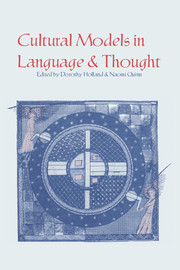Book contents
- Frontmatter
- Contents
- Preface
- List of Contributors
- Introduction
- Part I Presupposed worlds, language, and discourse
- Part II Reasoning and problem solving from presupposed worlds
- Part III The role of metaphor and analogy in representing knowledge of presupposed worlds
- Part IV Negotiating social and psychological realities
- 11 Myth and experience in the Trobriand Islands
- 12 Goals, events, and understanding in Ifaluk emotion theory
- 13 Ecuadorian illness stories
- 14 Explanatory systems in oral life stories
- Part V An appraisal
- Index
14 - Explanatory systems in oral life stories
Published online by Cambridge University Press: 05 June 2012
- Frontmatter
- Contents
- Preface
- List of Contributors
- Introduction
- Part I Presupposed worlds, language, and discourse
- Part II Reasoning and problem solving from presupposed worlds
- Part III The role of metaphor and analogy in representing knowledge of presupposed worlds
- Part IV Negotiating social and psychological realities
- 11 Myth and experience in the Trobriand Islands
- 12 Goals, events, and understanding in Ifaluk emotion theory
- 13 Ecuadorian illness stories
- 14 Explanatory systems in oral life stories
- Part V An appraisal
- Index
Summary
This chapter defines the explanatory system using oral life stories of middle-class American speakers as a source of data. An explanatory system is a system of beliefs and relations among beliefs that provide the environment in which one statement may or may not be taken as a cause for another statement. More specifically, an explanatory system of the type discussed here is a system of beliefs that occupies a position midway between common sense, the beliefs and relations among beliefs that any person in the culture may be assumed to know, if not to share, and expert systems, which are beliefs and relations among beliefs held, understood, and used by experts in a particular domain. An explanatory system is a system of beliefs derived from some expert system but used by someone with no corresponding expertise or credentials. Note that the term common sense as defined here closely corresponds to the notion of cultural models or cultural theories as used throughout this volume. The term expert system or some close equivalent is similar to the usage of Kempton, and Collins and Gentner (this volume). The term explanatory system represents an intermediate level that, to my knowledge, has received relatively little attention.
To clarify the definition of explanatory system, let us turn to two (constructed) example pairs. The first (1) gives a reason that relies on commonsense beliefs to account for professional choice.
- Type
- Chapter
- Information
- Cultural Models in Language and Thought , pp. 343 - 366Publisher: Cambridge University PressPrint publication year: 1987
- 34
- Cited by



